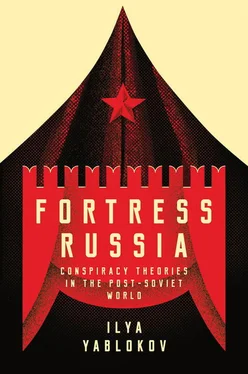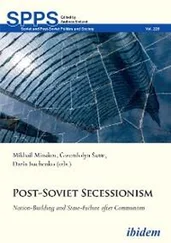In a 1992 collection of essays with a telling title Conspirology ( Konspirologiia ) Dugin acknowledged the global popularity of conspiracy theories and presented his own reading of the phenomenon. He argued that they were the product of postmodernist culture, which treated reality as a single and complex self-referential concept. Dugin explained global popularity and relevance of conspiracy theories in terms of historical and social prerequisites rooted in the human subconscious. A belief in conspiracies was already part of the ancient human perception of the world, he argued, and the survival of this belief into the present day mentally connected modern people with their ancestors (2005, pp. 8–11).
While Dugin’s justification for the popularity of this phenomenon might seem strange, it is actually not unusual for conspiracy theorists. The fact that people have believed in conspiracies for hundreds of years is in itself considered to be proof of the existence of secret plots. In turn, conspiracy theorists are doubtful that members of real secret societies are aware of the hidden workings of the world, and for this reason they pay to them particular attention (2005, p. 34). While such arguments convince Dugin that conspiracy theorists should be taken seriously, he still distances himself from them and calls himself a ‘psychiatrist’ who studies ‘weird pictures of social delusions’ (Dugin, 2010). Yet he contradicts himself: his collection of essays on conspiracy theories itself supports the idea of an anti-Russian plot.
Dugin contends that Russia is the Christian country which will save the world from the Apocalypse (Dugin, 2004, pp. 223, 229–32). He also sees her as the ‘axis of the Eurasian civilization’ which represents the powers of the Land, while the powers of the Sea are represented by the USA. This geopolitical standoff, he argues (2000), was one of the reasons for the collapse of the USSR; this was primarily the result of socio-economic factors, but the activities of internal enemies were a contributory factor. His acknowledgement that socio-economic factors were the primary cause of the Soviet Union’s collapse is an indication that he wishes to position his work as an academic endeavour; it also shows his peculiar handling of conspiracy theories. In Dugin’s view, the USA and the USSR represented two different models of society. The USSR was a society based on a tight cohesion of groups of people that was normally ruled by a single, ‘spiritual leader’, while the USA promoted individualistic aspirations and financial reward for its rulers (2005, pp. 191–2, 209–10). This division provides the framework for Dugin’s interpretation of the current state of world politics. Dugin’s reference to geopolitics was inspired by Halford Mackinder’s theory of geopolitics, which introduced the concepts of the Sea and Land powers into world politics (Mackinder, 1904). However, as Bassin and Aksenov note (2006, p. 109), Dugin’s interpretation of Mackinder’s theory reflects a Cold War vision of world politics, in which the USA and Russia are the two antagonistic world superpowers.
Dugin reproduces the spirit of the Cold War in his description of how the USA has attempted to build the New World Order to Russia’s detriment. The USA, or sometimes, more broadly, the Anglo-Saxon world (the USA and the UK), is presented as an undifferentiated West. In turn, Western Europe is portrayed as Russia’s ally in challenging US hegemony. This juxtaposition of Russia and the USA is one of the ideas which Dugin contributed to Eurasianism, a philosophy which emerged in the 1920s (Viderker, 2010). Eurasianism contrasted the Romano-Germanic world with the mixture of Slavic and Turkic cultures which were embodied in Russia (Laruelle, 2007). Dugin combined this understanding of geopolitics with Cold War thinking and with the body of anti-American literature popular among the European far right.
Among Dugin’s most significant contributions to Russian anti-Western conspiracy discourse is his appropriation of ideas from both European and, paradoxically, American conspiracy theorists. His engagement with Western conspiratorial discourse began in the late 1980s, following his first meetings with European right-wing politicians. As Umland (2007, pp. 106–8) has demonstrated, the journal Elementy: Evraziiskoe obozrenie ( Elements: Eurasian Review ) was heavily influenced by Alain de Benoist, a French New Right intellectual. In its second issue, several articles were devoted to his description of the New World Order and its threat to Russia’s security. These articles provided a detailed account of the ways in which internal and external conspirators had tailored the world in accordance with US ambitions. The editorial article in this issue briefly outlined the main aspects of the New World Order – world government led by the Trilateral Commission, market liberalism, the merging of different ethnic groups – which threatened to destroy the cultural uniqueness of nations (Dugin, 1992).
It is worth noting that narratives about the New World Order, which had allegedly started in the USA in the 1970s, reappeared in the USA as well as Russia at the beginning of the 1990s. This theory claimed that there was a single overarching organization that aimed to seize global power. As Michael Barkun notes (2003, pp. 62–4), the New World Order conspiracy emerged in the USA in the 1990s as a replacement for the image of the conspiring Other that had earlier been personified by the Soviet Union. The Soviet collapse in 1991 had left a vacuum in conspiratorial theorizing, which was filled by a new overarching concept of a single world government.
Dugin’s adoption of the New World Order theory, while it was simultaneously being embraced by his Western European and American counterparts, demonstrates his close engagement with foreign counter-cultural life. As Barkun noted (p. 64), the New World Order concept included every facet of the domestic and international agenda; it was this all-encompassing nature that made it virtually unfalsifiable. Dugin used this to the full. He merged his occult knowledge, his understanding of Eurasianist concepts and his work on geopolitics into an overarching theory of a Manichean divide between Russia and the USA. Dugin’s Foundations, which became popular among Russian political and academic elites in the 1990s, facilitated the development of a conspiratorial perception of global politics at the highest political level.
John Dunlop (2004, p. 49) and Charles Clover (2016, pp. 254, 260) suggest that Pavlovskii helped Dugin gain access to the Presidential Administration in the 1990s and the 2000s. In 2001, Dugin established a political movement, Eurasia , whose executive board included several high-ranking politicians, academics and journalists (Umland, 2009, pp. 133–5). In 2008 Dugin was appointed head of the Centre for Conservative Studies in the Faculty of Sociology at Moscow State University (Umland, 2011), despite not having the necessary academic qualifications. This appointment was the summit of his pseudo-academic career, reflecting the prominence of his ideas among the Russian political and intellectual elites. In 2014, he was removed from this position, however, and allegedly lost the support of the Presidential Administration, because of his critical comments on Putin’s actions in Ukraine (Filipenok, 2014). All the same, in 2016 he was instrumental in solving the crisis between the Russian and Turkish governments (Meyer and Ant, 2017).
Dugin’s conspiratorial ideas had an immense influence on Russian anti-Western discourse and were very much in evidence in popular television talk shows and programmes. At the beginning of the 2000s Mikhail Leont’ev, a prominent pro-Kremlin journalist and, from 2014, vice-president of Russia’s biggest oil company Rosneft and a member of Dugin’s Eurasia movement, helped Dugin gain access to television shows which were broadcast on the main state-aligned channels (Clover, 2016, p. 271). He replaced liberal-minded journalists and speakers who were gradually being squeezed out by the Kremlin. For Leont’ev, whose programmes were often called ‘five minutes of hate’ (Pomerantsev, 2013), Dugin was a great choice. In 2007 Leont’ev broadcast a television series entitled Bol’shaia igra ( The Great Game ) on Channel One ( Bol’shaia igra , 2007). Broadcast two months before the parliamentary elections, its eight episodes presented a conspiratorial outline of the struggle between Russia and the West, as represented by Britain and the USA, for world dominance, in terms which echoed Dugin’s philosophy. This notion of a standoff between Russia and the West was openly linked to Dugin’s theory of geopolitics and, at the same time, articulated one of the main narratives of the parliamentary campaign in 2007: resistance to an attack by the West against Russian statehood.
Читать дальше
Конец ознакомительного отрывка
Купить книгу












